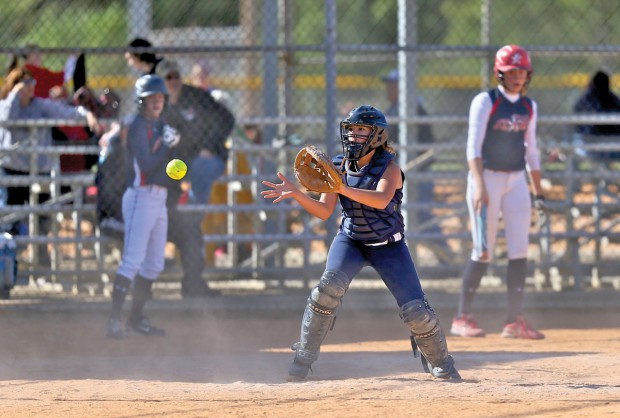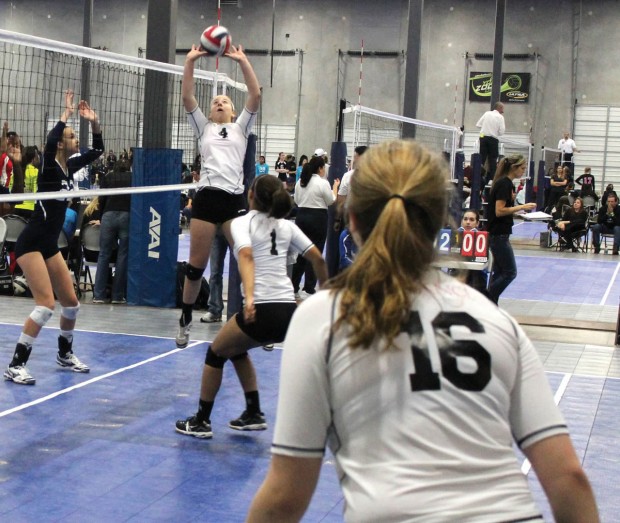Competitive Sports
It's a family thing


Being on a select team, with its professional coaches and more competitive opponents, has helped Megan Dickson improve her play.
Bill Dickson doesn't go fly fishing very often any more. He used to fish in Galveston two or three weekends a month.
Now, his weekends are spent at softball tournaments, or volleyball tournaments, or shuttling one of his two daughters to practice.
And he wouldn’t have it any other way.
Megan, 15, is a 10th grader at Lamar High School and a member of the Impact Gold Fisher select softball team. Sarah, 13, is an eighth grader at Trafton Academy and member of the 692 select beach volleyball team.
“I get so much enjoyment watching my girls do what they love doing, and doing it well,” said Dickson, a landscape manager with Thompson+Hanson. “We’re only going to have them for three and five more years, and we want to make the most of that time.”
Lots of kids play recreational sports after school or at a YMCA around the corner in a season that may last 6-8 weeks. But the Dickson girls, like many other serious athletes, are beyond that. They are deeply into the highly competitive, time-consuming realm of youth sports practiced under pros’ eyes in private gyms and fields, or on select club teams.
Individual sports, such as equestrian, fencing, gymnastics and swimming, may call for practice and events 4-6 days a week. Team sports are similarly time-consuming, with select or club team practice 2-3 times a week, on top of school-team practice, plus weekend tournaments, many out of town, 2-4 times a month.
During weekday rush hour, it takes the Dicksons an hour to get Megan to practice at Collins Park in Spring. On tournament Saturdays, the family is often out the door by 6 a.m. and doesn’t return until midnight or later. Then, they’re back out early again Sunday morning.
“There’s a reason we only had two children,” mom Kathy said with a laugh. “The poor dog is neglected.”
The Vincent family understands. Sometimes they divide and conquer. One parent will take daughter Ellie, a sophomore at Memorial High, to a swim meet while the other parent takes Tom, 12, a Memorial Middle School seventh grader, to a baseball tournament or a swim meet.
This can be especially interesting when they have competitions in different cities, as in 2012 when Tom attended a baseball tournament in Orlando and Ellie traveled to Boca Raton with her club team, Dad’s Club, for a swim tournament. Mom (Melanie) and Dad (Griffin) went with Tom to watch his Saturday games, and then Melanie drove over to Boca Raton to watch Ellie swim Sunday and get her on a plane back to Houston to attend a swim camp.
Many young athletes begin sports in a recreational league, where they discover their love of the game and learn the rules. But eventually, they want to play against a higher level of competition in tougher leagues with professional coaches.
Both Dickson parents coached softball in the West U rec league. “It gave the girls the basic skills and let them see what was out there. Because of that, we were able to say, ‘You know, let’s go select,’” Bill said.
The West U Softball Association is different than most rec leagues, though. The largest softball league in Texas, it accepts all players, but it also fields summer all-star teams that go to tournaments out of town. That league is very competitive, said Corbitt Burns, who has coached West U softball for the last eight years and whose four daughters play in West U softball but have never played for a select team.
“If I lived on the outskirts of town, I’d be in select league because it’s hard to find enough players to form competitive rec teams out there,” he said.
Megan Dickson is now on one of Impact Gold’s top select teams. As a high school freshman, she played on her varsity teams and won offensive player of the year and MVP and all-district newcomer of the year awards.
Even with that, she has to try out for the select team each summer, her spot as a utility player not guaranteed by what she did last year. Those tryouts can be stressful, players say.
And that’s one of the great character-building aspects of competitive leagues, parents said. The children learn the value of hard work, earning what they get, and dealing with failure.
Another life skill they learn, discipline, helps them balance the hours of practice with their homework – never mind the attempts to have a social life. But they understand that dedicating themselves to the sport will pay off more than sitting in a darkened theater for two hours, Megan said. Practicing hard means she’ll improve, she says, which will allow her to get on the best select team, which will get her more exposure to colleges. She hopes that that exposure will help her get fast-tracked into the upper-echelon college she’ll choose.
“Many of my friends are also in competitive sports, so they understand when I have to practice or have a tournament,” Megan said.
When there’s a big event she doesn’t want to miss, she simply tells her coach about it and misses practice that night, Megan said. “The coaches want us to have a social life.”
Megan chose to skip a big tournament in Dallas Memorial Day weekend this year because the school district used the planned off day as a makeup day, and she suddenly had two finals that Monday. The tournament wouldn’t have left her time to study.
“She understands that school comes first,” Bill Dickson said. “That’s the thing that will get her where she wants to go.”

Ella Hawes, #4, moved to a club volleyball team when she was 12 because she wanted to play more, practice more, and be challenged by more competitive players.
Ella Hawes, 15, a 10th grader at Bellaire High School who plays for Texas Alliance Volleyball Club, said, “Making the tradeoffs between school work, playing volleyball and hanging out with friends can be a drawback. It’s a balancing act – wanting to do something and having to pass on it because there other things I have to get done.”
Sometimes she has to skip going out with friends, and she’d love to go to a water ski camp this summer, but it’s the same week as volleyball camp. She was torn about which to attend.
And, she admits, she misses sleeping in on Saturdays. But she loves the sport and playing on the team, so she’s able to drag herself out of the comfy bed.
Tournaments start at 8 a.m., and the family typically leaves the house at 6 a.m. Her sister, Emily, 13, a seventh grader at River Oaks Baptist, plays volleyball for the Houston Skyline Juniors. Both girls play beach volleyball with Breakaway Speed.
Club teams also require parents to make a financial sacrifice – with team fees, travel, hotel rooms and private lessons, the costs can add up. It costs $2,500-$4,000 in club volleyball fees to play on a team traveling to out-of-state tournaments. Private lessons can cost $30-65 an hour.
“I’m sure that all families who allow their children the opportunity to pursue a hobby, whatever that may be, spend money to pay for it, and that money comes out of the family budget,” said Melanie Vincent. “In addition, there are many social aspects to the club games and travel that make those events family entertainment/vacations. For instance, instead of going to sleep-away camp this summer, Tom is in Cooperstown, N.Y., playing baseball, staying in the barracks with his teammates and coaches and having the time of his life.”
Studies show fewer than 1 percent of high school athletes get a scholarship to college, and in many sports, fewer than 20 percent of high school athletes even play college sports. But while some players hope that playing a sport at a high level will give them an edge in admittance to college, they’re not all playing with an eye toward a free ride.
When the Hawes family drives to tournaments in San Antonio, Dallas, Austin, St. Louis, Denver, Los Angeles and elsewhere, they have traditions along the way. Their father, David Hawes, says the routines reduce the stress the girls feel. They often stop at Whataburger for breakfast taquitos, and they don’t talk a lot during the ride as the girls spend the time thinking about the competition. If the tournament is out of town, they stop at Buc-ee’s for beef jerky and a snack.
After the tournament, David does a lot of listening to whatever is on his daughter’s mind. “It’s not always exclusively about the volleyball games,” he said. “But it’s a time to make sure our girls know they are loved, always, unconditionally, regardless of any outcome on the court. It’s become part of their competitive experience.
“The whole crux of it is that we’re doing this because it’s what the kids want,” said David, who used to ride in the MS150 bike ride each year. Now, there’s a 600-team volleyball tournament in Dallas that weekend that he attends with his daughters.
“Rec leagues are less stress, and they’re fun. But my girls prefer a competitive experience. They prefer playing with and against the best players around, to be taught by professional coaches who have played at a high level themselves, and they want to compete to be the best they can in their chosen sport.”
Want more buzz like this? Sign up for our Morning Buzz emails.
To leave a comment, please log in or create an account with The Buzz Magazines, Disqus, Facebook, or Twitter. Or you may post as a guest.


